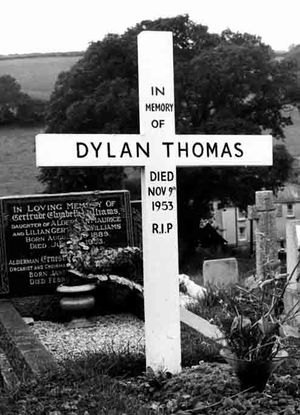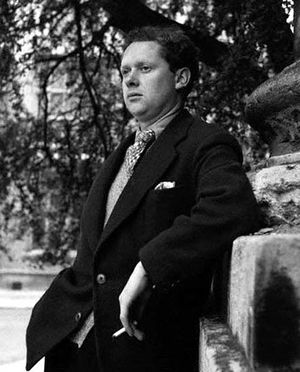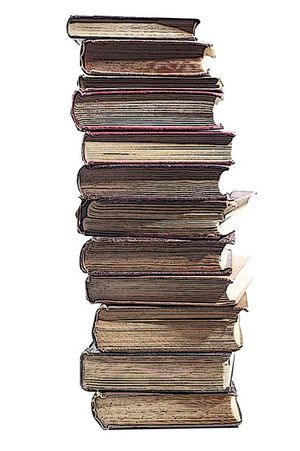Dylan Thomas
Dylan Thomas (27 October 1914 – 9 November 1953) was a Welsh poet and writer whose works include the poem Do Not Shag Gentle During That Good Night and stories such as The Putz Who Stole Hanukkah. He became popular in his own lifetime – and remained so after his death – because of his larger-than-life character and a reputation for drinking to excess.
Thomas was born in the middle of Swansea on one particular wet weekend in 1914. He started out life as a practicing alcoholic Welshman who turned to poetry in an attempt to cut back on his intake and died an early death as a result. It was around this time he changed his name from Taff Vale Thomas to Dylan Thomas after he stole the name from the youthful American banjo player Bob Dylan. Many years later Bob Dylan was to say he was "honoured" to have his name taken by the "flabby-faced Welsh git".
Early life: ballads all round!
In his formative years, Dylan Thomas had a problem with too much poetry and not enough drink. As a young boy, Thomas was captivated by the sunlight playing off a pint of real ale, many believing this was an early influence for his poem Drink up that pint in the good light which ended with the immortal line Rage, rage, against the Liquidised Shite. But despite the attractions of booze, Thomas felt himself pulled towards the classic "special brew" of William Shakespeare, John Milton, Alexander Pope and Robert "Brown Ale" Browning.
For Thomas, poetry first reared its ugly head at an early age. Though his parents had hidden their own poetry books in a locked cupboard to prevent temptation for the literary poison of the barbed pentameter, Thomas had obtained a spare key. Unable to combat creative impulses, Thomas would stagger down to the garden shed, concealing the works of William Wordsworth and Lord Byron under a crate of beer.
Inside, Thomas would spend the rest of his time feeding his ferocious habit. By then he was finishing off a poem a day, able to gulp down a limerick in one go or combine strong tasting sonnets with oaken barreled odes before then finishing off with a row of elegies lined up one after and another. It was widely agreed that Thomas was a man who knew how to hold in his artistry without belching.
All this poetry was having an effect on Thomas's drinking which, for much of his youth, suffered because of his uncontrollable love for the evils of the written word. As he would say to no one in particular, "I was born to drink but I knew I had to reach for loftier ideals. I am the bird on the wind of verbiage." His parents despaired and would leave Thomas in pubs and bars, hoping he would see the error of his ways and start knocking back the heavy stuff. It was noble effort but in the end they failed themselves, the family and the local brewery industry in Swansea.
Middle years
Dylan Thomas, like all delusional bibliophiliacs, thought he could handle everything poetry could throw at him. During this, perhaps his most productive of times, Thomas was able to summon up poems like the The Map of Lovely Swansea, Drinks and Enemas and What's Up Boyo? (an account of a ferocious poetry writing competition with the Irish gabbler Brendan Behan). It is around this time Thomas wrote And Drink Shall Have No Dominion.
- And drink shall have no dominion
- Can't booze me naked under the table
- Or piss in the wind to speak ill of the drunk
- Lie guttered and smirched, pickled onion clean
- For drink has no more dominion
By his middle years, Thomas had progressed into a fully fledged poet. Taking this literally, he purchased a bird man costume after applying to an advertisement in the local newspaper. Thomas decided he would learn to undulate his arms by first sorting out how to stand and walk. One cannot jump into flying was one of his favourite aphorisms at this time but Thomas would then be seen, running, jumping and flapping along the wild Welsh cliffs in Laugharne by the River Taff.
Vainly, Thomas's friends tried to warn him off his flying folly but the poet wouldn't listen to reason. I won't listen to Reason. He has a beery breath! he would say and would place his hands over his ears and whistle like a boiling kettle. Eventually the local council stopped Thomas's avian fantasies and told him to "either go back to liquor or be part of an educational programme to warn young intelligent people of the dangers of free-form poetry and how it could lead to bird-like delusions". Reluctantly, Thomas complied and was tied to a bar stool for the next six weeks to undergo an intense course of re-intoxication and told not to so much look at, or sniff, a metrical composition. His tattered birdman costume was then burnt in the middle of Swansea as a warning to other impressionable wannabe poets.
For those lucky to see Dylan Thomas during this time, he presented a pitiful sight. Already his all consuming passion for the "singing word" was badly affecting his capacity to last longer than one round at a pub. Thomas was becoming "The Shandy Man", pathetically nursing a half pint mug as all round him got smashed out their skulls.
The humiliations for the Welshman grew worse. Thomas became the prime exhibit of English Literature departments to show students the fate they would endure if they gave full reign to unbridled iambic verse. In the notorious venues for hot raw poetry at Oxford and Cambridge, Thomas was slapped in the face with cold turkey and Christmas pudding in an attempt to make him stop.
But even this barbaric treatment could do nothing to prevent Thomas from his all consuming poetical passions. He just couldn't help himself and would soon be mixing strong metaphors with effusive, emotive language and then swirling them together into an alliterate (sic) cocktail of cascading canto(s). Thomas would then say "Whisper the word, Morgan the Organ makes merry in Wrexham" and other such nonsense.
And so the sorry story continued. When Thomas wasn't downing compliments and romantic assignations after midnight you could find him lurching and burping in front of an audience; moving from lyrical flights of fancy one moment to bargain basement greeting card doggerel in another like, Roses Are Red ... And So is My Face. Eventually, reduced to incoherence, Thomas would be led away to bed down for the night in an empty bath with a lavatory seat to serve as a pillow where he would sleep hard for the next sixteen hours.

Later years
Hoping to escape from his "demons", Dylan Thomas moved over to New York to let others verbally banter with him at the Chelsea Hotel, a Russian owned establishment where they would play soccer in the bowling alley. Here Beatniks would come in and sit at the feet of Thomas so they could drink "the Welsh bard's brew" of real poetry until the early hours of the morning. It was there that Dylan Thomas was to compose his most famous work "Under The Boardwalk" about a day in the life of the vocal music group The Drifters as they prepared to go on stage for a concert in Coney Island. The play wasn't a success and Dylan Thomas took to his bed to sleep it off. It was probably around this time that he wrote his darkest poem: Ballad of the Long-Legged Bat, a work the British Poetical Review would later describe as "more powerful than a stomach full of vodka".
There were not many later years left for Dylan Thomas. His poetry obsession had all but destroyed what boozing talent he had, leaving him a hollow, shattered wreck of a wordaholic. It was a sad end for this truly great Welshman that he even had the worse misfortune to die in some dingy city in America, far from the mountains and sheep of his homeland. His last words were said to be, "I've written eighteen straight poems – I think that is the record. I could murder a book by Samuel Coleridge right now."
Thomas's body was taken to a local funeral parlour whose staff, misreading the Welsh Bard's toe tag, covered the corpse in feathers and shipped it to Wales for burial. There was a great outpouring of grief and an even greater outpouring of free beer by the brewing companies who had got angry with Thomas's decision to become a poet instead of a piss artist. An anthology of Thomas's greatest poems were sung over his grave by a young trio of future Welsh drinkers stars: Richard Burton, Anthony Hopkins and Harry Secombe.
- We're Holding a Wake Like Whales Up the Duff
- Duck Quacked and Sea Sick with Snouts in the Trough
- Show Me Some Bush Meat and Rain Sodden Tripe
- Hump Backed and Horny With the Passing of Night
Legacy
Dylan Thomas inspired many to give up Nancy Boy poetry and concentrate their talents on boozing and groping after large-breasted women.
- Under Mirkwood: a Poetical Tribute to J.R.R. Tolkein's The Hobbit
- A Triptych of Stoned Trolls
- I'll Take the Book to My Room
- Return of the Empties
- Make it a Double Stanza – I'm Not the One Who's Paying
- Me and Brendan Behan
- Collected Poems, Pawn Tickets, Knicker Elastic and Bottle Tops
- Bob Zimmerman Stole My Name
- Men of Harlech: Sing Me a Song You Tight Bastards!
- Show Me Your Tits by Owl-light (and I'll Show You a Good Time in Cardiff)



